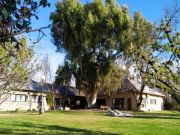Laos Refugees in the Middle Valley See map
As locally the Syrian-Lebanese are called "Turks", the Hmoob are "Laotians". Attachments fixed and that no one cares to check. The historical moment and the conditions that have entered the country these groups of immigrants / refugees, are the "seal" with which they have to live together.
The Hmoob entered the country as refugees in the late 1970s under UN trusteeship. They were part of a contingent of Laotians and Vietnamese who managed to unbolt the refugee camps located in Thailand, victims of the war in Vietnam.
The military government decided to accept some of these refugees as a way to improve its international image in its more questionable side: "human rights".
Both Vietnamese and Laotians had to pass through an adaptation extremely difficult, given the cultural differences and a forced inclusion in rural areas where most had no history. The Hmoob that arrived to the Middle Valley from rural highlands of Laos, gradually succeeded, despite the shock of change, an insertion in regional agricultural economic activity as efficient gardeners.
Households that were able to maintain internal cohesion as economic group are joining now striding "healthy" second generation, diversifying the range of integration in various activities, while maintaining its base in agriculture serves to contain the whole group.
The Hmoob are "distant" from the ethnic groups in the lowlands of Laos, both linguistic and social and religious. The background is recognized to have entered the highlands of Laos about 400 years ago, but have their roots more akin to the Mongols, but far too powerful identity from China.
About 10 extended Hmoob families are the ones that have remained in Middle Valley since its settlement in the 70's, who have given local roots. Some of their relatives in the seizure of entering the country chose to migrate to the U.S., the Mecca of refugees from the Vietnam War.
The Middle Valley Hmoob still retain cultural elements that make their clothing, tools, modes of feeding and rearing of children. While the oldest observed failure to clear communication in spanish, children with complete fluency in local language management, serve as interpreters for their elders in daily dealings.
The recipient society has simplified (reduced) its recognition in a widespread taxon of "Laotians", preventing the full appreciation of community identity.
The Hmoob, after the misfortunes endured for generations in his homeland in Indochina, try to maintain internal consistency reaffirming their self-esteem, without entering into conflict with the host society.
The loneliness of being uprooted for small groups is part of the tragedy of present history of mankind, and the Hmoob bear in this region with the lowest degree of alienation and greater dignity.
Alojamiento en Choele Choel
Viajes por la Patagonia
Related Articles
© Patagonia.com.ar 2025 | Todos los derechos reservados.

